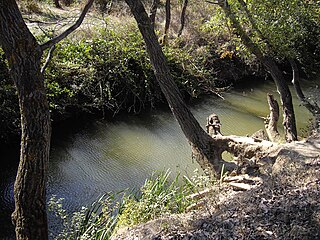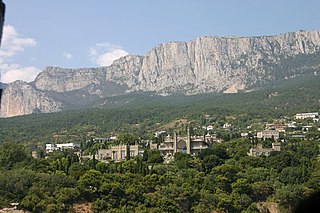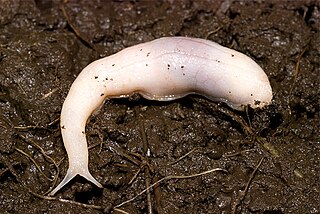
"Tatar" is an umbrella term for different Turkic ethnic groups bearing the name "Tatar" across Eastern Europe and Asia.

Crimea is a peninsula in Eastern Europe, on the northern coast of the Black Sea, almost entirely surrounded by the Black Sea and the smaller Sea of Azov. The Isthmus of Perekop connects the peninsula to Kherson Oblast in mainland Ukraine. To the east, the Crimean Bridge, constructed in 2018, spans the Strait of Kerch, linking the peninsula with Krasnodar Krai in Russia. The Arabat Spit, located to the northeast, is a narrow strip of land that separates the Syvash lagoons from the Sea of Azov. Across the Black Sea to the west lies Romania and to the south is Turkey. The population is 2.4 million, and the largest city is Sevastopol. The region, internationally recognized as part of Ukraine, has been under Russian occupation since 2014.

Yalta is a resort city on the south coast of the Crimean Peninsula surrounded by the Black Sea. It serves as the administrative center of Yalta Municipality, one of the regions within Crimea. Yalta, along with the rest of Crimea, is internationally recognised as part of Ukraine, and is considered part of the Autonomous Republic of Crimea. However, it is under the control of Russia, which annexed Crimea in 2014 and regards the town as part of the Republic of Crimea. According to the most recent census, its population was 76,746 .

Simeiz Observatory was an astronomy research observatory until the mid-1950s. It is located on Mount Koshka, Crimea, by the town of Simeiz.

Crimean Tatars or Crimeans are an East European Turkic ethnic group and nation indigenous to Crimea. The formation and ethnogenesis of Crimean Tatars lasted over 2500 years in Crimea and the Northern Black Sea region, uniting Mediterranean populations with those of the Eurasian Steppe.

The Crimean Khanate, self-defined as the Throne of Crimea and Desht-i Kipchak, and in old European historiography and geography known as Little Tartary, was a Crimean Tatar state existing from 1441–1783, the longest-lived of the Turkic khanates that succeeded the empire of the Golden Horde. Established by Hacı I Giray in 1441, it was regarded as the direct heir to the Golden Horde and to Desht-i-Kipchak.
Gurzuf or Hurzuf is a resort town in Yalta Municipality of the Autonomous Republic of Crimea, a territory recognized by a majority of countries as part of Ukraine but incorporated by Russia as the Republic of Crimea. Population: 8,933 .

The Alma is a small river in Crimea that flows from the Crimean Mountains in a broadly west-north-west direction to the Black Sea. Its mouth lies just south of Pishchane, halfway between Yevpatoria and Sevastopol. Alma is the Crimean Tatar word for an "apple".

Alupka is a resort city located in the Crimean peninsula, a territory of Ukraine currently annexed by Russian Federation. It is located 17 km (11 mi) to the west of Yalta. It is famous for the Vorontsov Palace, designed by English architect Edward Blore in an extravagant mixture of Scottish baronial and Neo-Moorish styles and built in 1828–1846 for prince Mikhail Semyonovich Vorontsov.

The Crimean Mountains or Yayla Mountains /jaɪːlə/, /jeɪːlæ/ are a range of mountains running parallel to the south-eastern coast of Crimea, between about 8–13 kilometers from the sea. Toward the west, the mountains drop steeply to the Black Sea, and to the east, they change slowly into a steppe landscape.

The Eurasian Steppe, also called the Great Steppe or The Steppes, is the vast steppe ecoregion of Eurasia in the temperate grasslands, savannas and shrublands biome. It stretches through Hungary, Bulgaria, Romania, Moldova, Ukraine, southern Russia, Kazakhstan, Xinjiang, Mongolia and Manchuria, with one major exclave, the Pannonian steppe, located mostly in Hungary.

Crimean Trolleybus Line in Crimea is the longest trolleybus line in the world. It is 86 kilometres (53 mi) long, between the capital of Crimea, Simferopol, and the coastal city of Yalta on the Black Sea.

Ayu-Dag is a summit of Crimea. It is also known under the Russified name Medved'-gora . The summit is located 16 km north-east from Yalta between the towns of Gurzuf and Partenit.

Selenochlamys ysbryda, the ghost slug, is a species of predatory air-breathing land slug. It is a shell-less pulmonate gastropod mollusc in the family Oxychilidae, although when first described it was assumed to be in the Trigonochlamydidae.

The wildlife of Ukraine consists of its diverse fauna, flora and funga. The reported fauna consists of 45,000 species when including the areas of the Black Sea and the Sea of Azov. Ukraine's protected environments consist of 33 Ramsar sites covering an area of 7,446.51 square kilometres (2,875.11 sq mi). Biosphere nature reserves and three national parks are all part of the GEF projects portfolio of conservation of biodiversity in the Danube Delta. Their vegetation pattern is mixed forest area, forest-steppe area, steppe area, Ukrainian Carpathian Mountains and Crimean Mountains. Some of the protected areas that were reserves or parks are subsumed under the biosphere reserves.

Taurinellushka is a genus of air-breathing land snails, terrestrial pulmonate gastropod mollusks in the family Pristilomatidae.

Karadag Nature Reserve is a protected nature reserve that covers a portion of the southeast coast of the Crimean peninsula. Encompassing mountains, forest-steppe, shoreline and marine areas, Karadag is an area of high biodiversity and the subject of much scientific study throughout the past 100 years. It supports a high number of Crimea's endemic species, and important bird colonies. The reserve is 36 km southwest of the city of Feodosia, and is currently administered by the Russian Academy of Sciences.

Crimean Nature Reserve is a protected nature reserve that covers a portion of the Crimean Mountains, on the south coast of the Crimean Peninsula. The reserve protects mountain-forest and meadow steppe plants and animals, with a high level of biodiversity. It is located just north of the town of Massandra.

















